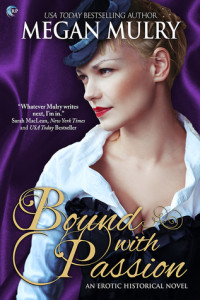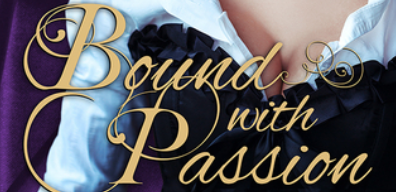 I received a copy of Bound With Passion, by Megan Mulry, from Netgalley.
I received a copy of Bound With Passion, by Megan Mulry, from Netgalley.
Description from Goodreads:
Lady Georgiana Elizabeth Cambury has been a “wild romping girl” all her life: dressing in trousers, riding astride, and doing just fine, thank you very much. Her father’s exceedingly generous bequest—and her mother’s liberal views of the world—have ensured that Georgie will never be a slave to the barbarous institutions of marriage or motherhood. Or so she thinks.
When she returns from five years in North Africa to boring Derbyshire for a brief, obligatory family visit, she finds herself in the midst of a legal snarl involving Mr. James Rushford and Lord Trevor Mayson—neighbors, lovers, and her two closest friends. Mayson’s father has declared that he must marry or forfeit his vast inheritance, so Georgie blithely offers to walk down the aisle, in name only. Problem solved.
But try as she might, Georgie cannot ignore the passion that quickly blazes between all three of them. When her marriage of convenience turns into something much deeper, Georgie must decide if she is willing to give up the independence she has fought so hard to achieve—or if love is worth the ultimate surrender.
Review:
Blerg. I mean seriously, blerg. I mean it made me want to toss my Kindle and have a Feminist melt down, blerg. I get that some people like this sort of heroine and this sort of story but I’m not one of those people and I feel a little tricked. Because I think the first couple paragraphs of this book’s description lead the reader to expect a strong, confident, capable main character. Instead, the only sentence you should really pay attention to is that last one about surrender.
I’ll start with a few quotes. That will make this all go by more quickly.
Trevor loved talking about her that way, as if she were some object that James and Trevor were assessing, like a fine brandy they were passing back and forth between them. And she liked it too, from the look of melting lust in her eyes.
Georgie’s body reminded him of the crucible steel he’d seen in Sheffield: all strength finally burning so hot that it nearly begged to be bent and molded into something new and useful, unlike what it had always been.
“Yes, picture him doing that to me you dirty thing.”
During the night, even after they had snuffed all the candles and collapsed onto the bed for much-needed rest in complete darkness, Trevor had somehow known how to best adjust her body in ways that were more comfortable than she herself knew how to move.
So, throughout the book she’s objectified and described as enjoying rough, dehumanizing sex (because she hates anything soft, loving and emotional–in other words anything feminine). She’s not seen as useful as a human person without a man to remold her. She’s dirty for even thinking about something that the men aren’t described as dirty for actually doing and she’s so unaware of her own body and self that she can’t even get comfortable without the man to do it for her. She’s also selfish and incredibly unpleasant. Of course she is, she has the emotional development of a child after all. BLERG!
But my main issue was with the absolute contempt for womanhood in this book. It infuriated me. But I so wanted that strong heroine that the blurb set me up for that I even spent half the book making excuses for her. I thought, maybe it’s not hatred of femaleness, but a hate for the constraints on woman of the time. But no, that didn’t seem to be the case. Then I thought, maybe she is trans and actually feels herself more to be a man. But no, that proved not to be the case either. The book simply presents the reader with a woman who despises all things female and needs to be summarily punished for being a woman before she can submit, as all good women must, to having sex with a man (which of course she loves and all is right with the world.) BLERG!
Then there is the odd fact that despite being a rare relationship model in the 1800s, everywhere the characters went they met with other poly families and LGBT+ couples. It’s great and all, but there were almost no straight people in the book at all, which isn’t so much a complaint about representation as of unrealistic simplicity of the plot. There were simply too many people in non-normative relationships who were very open about them during a repressed time period. If this had occurred only within the characters’ circle I wouldn’t mention it, just assume they surrounded themselves with people they could relate to. But its everywhere they go and everyone they meet.
Then there is the Egypt scene. I don’t want to be too spoilery, but this may be. James is introduced to a man and has a 2 minute conversation with him about fabric, and then feels comfortable asking him if he can bring his lover and his wife to his house to let the man’s two wives seduce her in order to somehow excise the stubborn willfulness from her, so that she’ll be a more appropriately pliable wife (as they all secretly watch). First, how did he know that man would be ok with that outlandish request (or his wives)? Second, what on earth made him think being seduced by two unknown women would have that effect, especially since she’d never shown an attraction to women in the past? Third, how exactly does that work? It was this kind of magical, the author says it’s so, so it is, even if it makes no sense kind of writing that made me really dislike this book in the end.
No, this was not a winner for me. In fact, despite having a wonderful m/m pairing, it still basically represents everything that makes me reluctant to read het romance in the first place. Is it really so much to ask for a heroine who doesn’t need a man to teach her how to be human? Georgie, didn’t know herself, didn’t know her emotions, didn’t know how to love, didn’t even know how to get comfortable in her own body, family or home until these men came along and taught her. In fact, she didn’t even know that she didn’t know all those things. I say again, BLERG!
